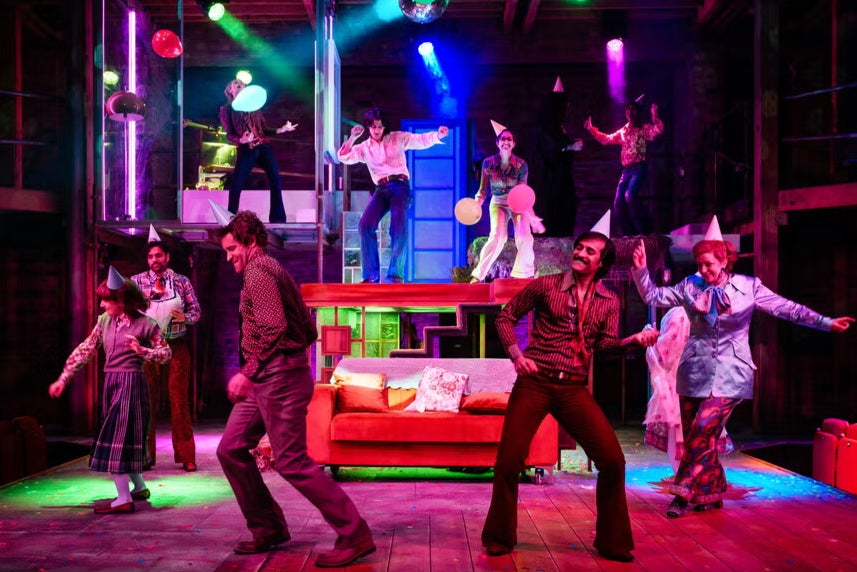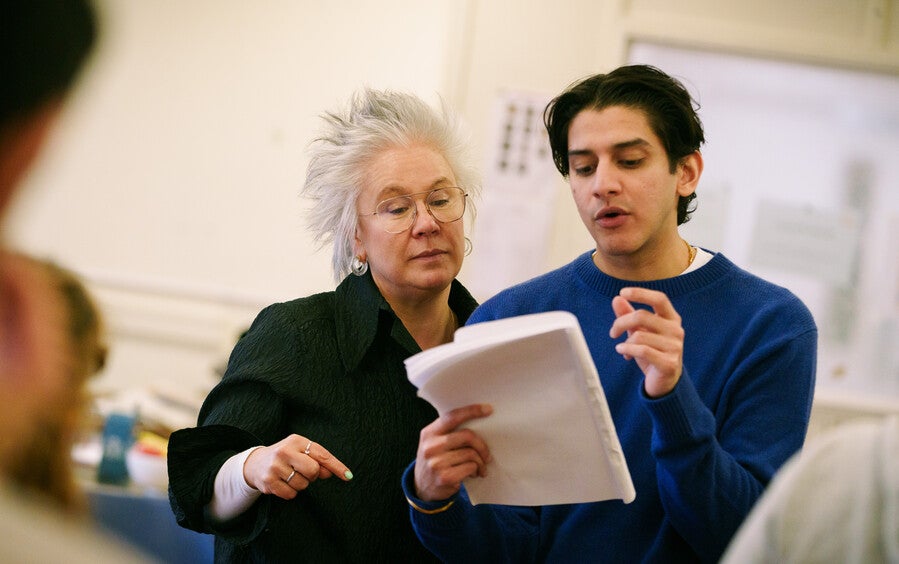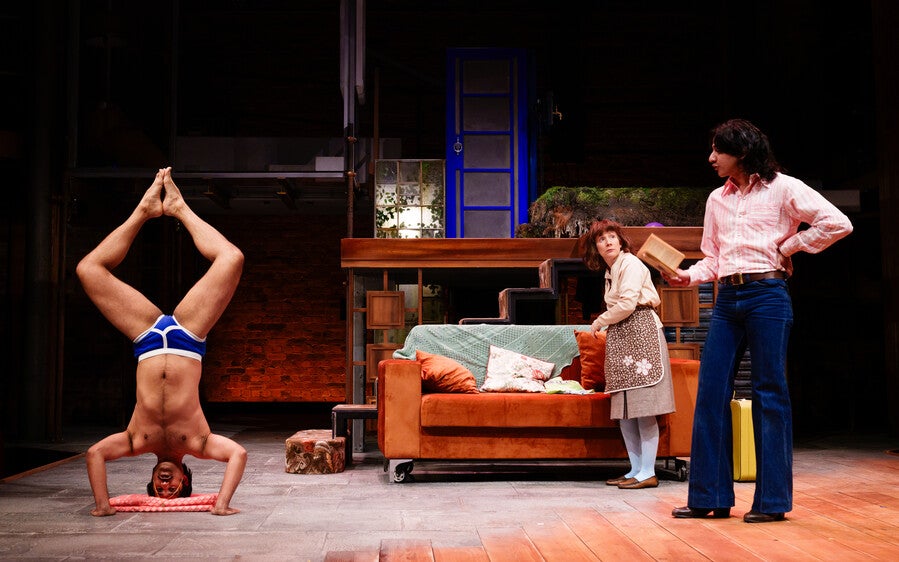The RSC takes on The Buddha of Suburbia: ‘There will be long hair, offensive flares and party poppers’
Theatre director Emma Rice has added her exuberant touch to Angela Carter, Emily Bronte and Enid Blyton – now she’s bringing Hanif Kureishi’s landmark 1990 debut novel to the stage. She tells Tim Bano why she wanted to adapt the novel, her inventive approach to sex scenes, and how the author has stopped her going down the wrong track

Hanif Kureishi’s freewheeling novel The Buddha of Suburbia is heading to the Royal Shakespeare Company’s stage. “There’s going to be long hair, offensive flares and party poppers,” grins theatre maker Emma Rice. The acclaimed director has made a career of turning big books and films – The Red Shoes, Brief Encounter, Wuthering Heights, Malory Towers – into theatrically thrilling, emotionally exuberant shows. Now she’s taking on another landmark of literature in the shape of Kureishi’s debut. But… south London in the 1970s? Doesn’t that seem a little drab, a little mundane compared to the fantastical worlds of her previous shows? Well, in Rice’s hands, you know it’s not going to be anything of the sort.
“When I was growing up in the Seventies my mum and her friends used to get together to make patchwork skirts,” Rice recalls. “They would get very drunk and smoke. What I remember most is the smell of smoke coming up the stairs, and lots of laughter. This show is my homage to a bad patchwork skirt, pieced together from different fabrics, and everything reeking of cigarette smoke.”
Kureishi’s novel, based to some extent on his own life, is a dizzying, sometimes shocking blur of south London life in the Seventies. It’s narrated by Karim, son of an English mother and Indian father, who goes on a sexual and spiritual odyssey through the suburban wilds, discovers music, becomes an actor, encounters racism and constantly chases the next high, whether it’s sex, songs, drugs or clothes.
“It’s Shakespearean in its weight,” Rice says. “It’s a big book, and it’s a big, big show. Trying to digest that much material takes hours, but they’re fabulous hours and we’re stupidly happy.”
She notes the parallels to society today: ongoing strikes, high inflation, ending on the eve of a seismic general election that saw Thatcher come to power. “The relevance is breathtaking and slightly depressing. We’re on the eve of an election now. Who knows? Maybe we’re on the edge of a revolution.”
Ironically, a train strike has prevented us from chatting in person. Instead she’s on a Zoom call during a break from rehearsals at the Royal Shakespeare Company where the show has been programmed as part of the debut season from its new artistic directors Tamara Harvey and Daniel Evans.
“It doesn’t take a detective to work out why I wanted to adapt this. I love these big messy family sexy novels in which theatre plays a large part.” She describes it as “the brother” to her 2018 show Wise Children, adapted from the Angela Carter novel and also the name of Rice’s theatre company, a show that exemplified her at her ebullient best: music, dance, huge inventiveness, comedy and sadness colliding head on.

There was plenty of sex in Wise Children, but even more so here – though the explicit stuff will be handled (if that’s the right word) theatrically via a series of fruits. The orgy scene, she says, will be pure farce. “It’s very technical so we’ve spent a ridiculous amount of time on that, laughing until we cry.”
Like Wise Children, too, The Buddha of Suburbia is set largely in the theatre world – and it’s in that world that Kureishi deploys his most vicious, comic and uncomfortable scenes. Before he wrote The Buddha of Suburbia, and before he broke ground with his screenplay My Beautiful Laundrette in 1985, about a gay British-Pakistani boy in 1980s England, Kureishi had a successful career as a playwright. There are chunks of Buddha that read like retribution. A white, middle-class director makes Karim play Mowgli in The Jungle Book wearing a loin-cloth and brown makeup, doing an Indian accent. His fellow cast members don’t object.
At one point, Karim says: “As your buttocks were being punished on steel and plastic chairs you’d look across grey floorboards at minimal scenery…The actors wore clothes just like ours, only more expensive. The plays were three hours long, chaotic and bursting with anarchic and defiant images. The writers took it for granted that England [...] was disintegrating into terminal class-struggle. These were the science-fiction fantasies of Oxford-educated boys who never left the house. The middle class loved it.”
Rice says she sees a lot of that still today. “And I see myself in it as well. One of the things that hasn’t changed is that a director takes a group of people and manipulates them – one hopes consensually. It’s so recognisable. We laugh a lot in rehearsal rooms. Those scenes are a great, naughty honouring of our craft.”
You cannot do ‘The Buddha of Suburbia’ without Hanif, because it’s him through and through
It’s also a book about being mixed race, about bisexuality, about masculinity. Did Rice ever question whether she was the right person to adapt it? “Yeah, of course I’ve thought about it. But I felt passionately that I had a really strong connection to the book.” Kureishi, she explains, has been on hand to guide Rice, even after suffering a fall in 2022 that left him with severe spinal injuries. “You cannot do The Buddha of Suburbia without Hanif, because it’s him through and through. I’ve taken some wrong turns, and believe me, Hanif tells me when I’ve gone down the wrong track.”
“I have a room full of people who I work with, with humility and respect and wonder,” she continues. “We’re absolutely working on this together. And it’s happening, so now I suppose it’s about others to judge whether that was a good idea or not. But my goodness, I wanted to do it and I’ve made sure I’ve been surrounded by all the right voices. And I’m listening more than I’m more than I’m talking.”
As Rice points out, “the British-Asian culture had not really been represented in popular culture until the book came out. It was rude, it was real, it was about diverse communities.”
There’s a striking line in the novel when Karim faces opening night of a play he’s appearing in: “Suddenly, this was it, the night of nights, and I was on stage alone in the full glare of the lights, with 400 white English people looking at me.”
She and the RSC, she says, are “working really hard” to ensure that’s not the case when Buddha opens. “We’re close to a lot of amazing south Asian communities here [in Stratford-upon-Avon], so I hope we notice a change when we’re looking out into the audience.”
It was another Shakespearean stage that proved troublesome for Rice. She resigned as artistic director of Shakespeare’s Globe in 2018 after irreconcilable differences with the theatre’s board. So does she have any words of advice for Evans and Harvey as they take the helm of a huge Shakespeare-focused theatre company?

“Oh god no. One thing nobody ever really needs is advice. They know that if they ever want to have a glass of wine and say ‘this is so hard’ then I’m there, but they don’t need my advice. I’m just cheering them on. It’s a tough time for theatre, and what we need is energetic, strong leadership.”
It had been a tough time for Rice, too: there was the Globe stuff, then the pandemic hit just as her new company Wise Children was building momentum. Her adaptation of Wuthering Heights was beleaguered by Covid, cast injuries and then a flood that wiped out a whole run in Los Angeles. Meanwhile, the company where she made her name, Kneehigh, wound down for good.
When I spoke to her in 2021, she was seriously considering quitting as a director. “I remember feeling that I was so proud and happy with the work I’d made and with my career that I didn’t want it to diminish. I didn’t want to become something I wasn’t proud of.”
But, she says touching wood, the tide has turned. “I realised I had several shows I needed to make before I wanted to get out. Now we’re on the absolute up – and that takes luck, but also requires being very careful and clever about who I work with.”
Since then, Rice hasn’t stopped. Last year Wise Children bought an old Methodist church in Somerset and converted it into a venue, The Lucky Chance. They staged their first show there, The Little Matchgirl, at the end of 2023, then came a tour of Blue Beard at the beginning of this year, and now comes The Buddha of Suburbia – fruit, flares and all. “I’m on my knees,” she says, “but we’re having very happy times.”
‘The Buddha of Suburbia’ is at the RSC until 1 June
Join our commenting forum
Join thought-provoking conversations, follow other Independent readers and see their replies
Comments
Bookmark popover
Removed from bookmarks